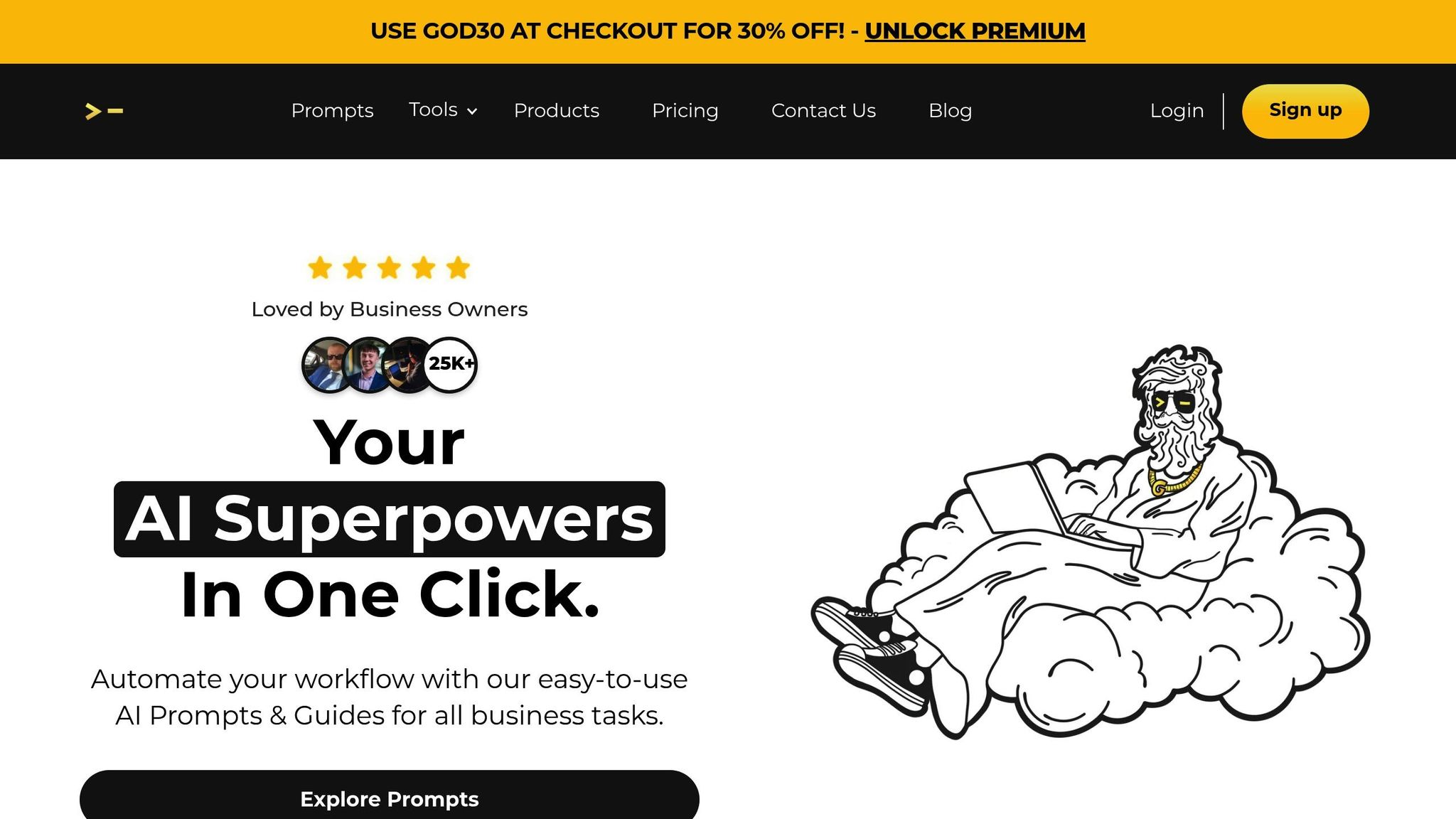Ultimate Guide to Choosing Business Prompt Libraries

AI prompt libraries save businesses time and improve efficiency by providing pre-designed templates for tasks like marketing, SEO, and content creation. Instead of crafting prompts from scratch, you can use these libraries to guide AI tools like ChatGPT, Claude, Midjourney, and Gemini AI, ensuring consistent and effective results.
Key Takeaways:
- What They Are: Collections of pre-made instructions for AI tools.
- Why They Matter: Reduce time, improve productivity, and ensure consistent outcomes.
- Popular Tools: Compatible with ChatGPT, Midjourney, and more.
- How to Choose:
- Look for industry-specific prompts.
- Evaluate pricing (e.g., one-time vs. subscription).
- Ensure compatibility with your tools.
- Example: God of Prompt offers 30,000+ prompts, lifetime updates, and pricing options starting at $37.
Quick Tip: Test libraries with free trials or sample prompts to ensure they meet your needs before committing.
Top 7 Prompt Libraries for Unlimited Prompts
How to Evaluate Business Prompt Libraries
Selecting the right prompt library for your business is more than just picking a tool - it’s about finding a resource that directly supports your goals and enhances productivity. With so many options available, it’s essential to evaluate libraries based on criteria that align with your company’s specific needs and objectives.
Prompt Quality and Business Relevance
The effectiveness of a prompt library starts with the quality and relevance of its content. Strong libraries offer well-crafted prompts that align with industry standards and meet the unique challenges of your business. Instead of generic templates, look for prompts designed to address the specific scenarios your company encounters daily. Whether it’s drafting marketing campaigns, responding to customer inquiries, or preparing financial reports, the prompts should feel like they were made for your team.
For example, God of Prompt organizes its collection of over 30,000 prompts into categories like marketing, finance, e-commerce, education, sales, and productivity. This structure makes it easy to find prompts tailored to your industry and operational needs without wasting time on irrelevant content.
Before committing to a library, test its effectiveness. Many platforms offer sample prompts or trial periods to let you evaluate the output quality. Pay attention to how prompts perform across various AI tools and whether they consistently meet the professional standards your business requires.
Pricing Models and Cost Analysis
Understanding the pricing structure of a prompt library is crucial to determining its overall value. Most libraries fall into one of three pricing models: free tiers with limited features, subscription plans, or one-time purchase options.
- Free tiers are great for testing but often lack the depth businesses need for long-term use.
- Subscription models provide ongoing access but may lead to higher costs over time.
- One-time purchases offer predictability, making them appealing for businesses looking to avoid recurring fees.
Take God of Prompt as an example. Its pricing ranges from $37.00 for specialized bundles to $150.00 for the Complete AI Bundle, which includes lifetime access to all 30,000+ prompts with updates. This one-time investment eliminates recurring costs and ensures you’re always working with the latest resources.
To calculate the return on investment (ROI), consider the time saved. For instance, if a marketing prompt saves your team two hours of work and your average hourly rate is $50.00, that single prompt delivers $100.00 in value. Multiply that by the thousands of prompts available, and the cost-benefit becomes clear.
Additionally, features like a 7-day money-back guarantee, as offered by God of Prompt, reduce financial risk. You can explore the library fully before committing, ensuring it meets your business needs.
Tool Integration and Compatibility
A prompt library’s value isn’t just in the quality of its prompts - it’s also in how seamlessly it integrates with your existing tools. The best libraries support multiple AI platforms, giving you the flexibility to use the right tool for each task without being tied to a single ecosystem.
For example, God of Prompt is compatible with major AI tools such as ChatGPT, Claude, Grok, Veo, Sora, Midjourney, and Gemini AI. This ensures consistent prompt quality no matter which platform you use. Additionally, libraries that integrate with familiar tools like Notion make it easier for teams to incorporate prompts into their workflows, reducing the learning curve and improving collaboration.
It’s also worth considering how the library handles updates. As AI technology evolves rapidly, your chosen library should adapt to support new platforms and capabilities. Lifetime updates, like those offered by God of Prompt, ensure the library remains a valuable resource as your business and technology needs grow.
God of Prompt: Complete Business Solution

When it comes to choosing a prompt library for your business, God of Prompt emerges as a powerful option tailored for professional use. With a collection of over 30,000 AI prompts and a proven track record of serving more than 17,060 customers, this platform caters to the varied demands of modern industries. Here’s why God of Prompt is a go-to resource for businesses looking to streamline operations and enhance productivity.
Main Features and Benefits
God of Prompt offers an extensive library of prompts designed specifically for business needs. These prompts are categorized into key areas like marketing, finance, e-commerce, education, sales, and productivity, making it easy for teams to find relevant solutions for their projects.
The platform is compatible with multiple major AI tools, ensuring your team can work seamlessly across different platforms without needing to learn separate libraries. Whether you're crafting marketing campaigns or designing visuals, these prompts are designed to integrate effortlessly into your workflow.
For more targeted applications, custom GPTs provide specialized solutions such as SEO research, competitive analysis, idea generation, humanized text, sales emails, and marketing frameworks. Each prompt is equipped with clear objectives, actionable steps, and formatting instructions, making them ready to use right away.
With an average rating of 4.8 out of 5 from 743 reviews, and a wealth of how-to guides and resources, God of Prompt has established itself as a trusted tool for businesses looking to leverage AI effectively.
Pricing Plans and Options
The platform’s pricing structure is designed to accommodate a variety of budgets and business requirements, offering both free and premium options.
- Free Tier: Includes access to 1,000+ ChatGPT prompts, 100+ Midjourney prompts, and 10 free mega-prompts with lifetime updates.
- Writing Pack ($37.00): Offers 200+ mega-prompts tailored for writing tasks, complete with lifetime updates and detailed guides, accessible via Notion.
- ChatGPT Bundle ($97.00): Provides 2,000+ mega-prompts and all premium prompts, including lifetime updates - ideal for businesses heavily focused on ChatGPT resources.
- Midjourney Bundle ($67.00): Features 10,000+ Midjourney prompts, guides, and lifetime updates, perfect for visual content creators.
- Complete AI Bundle ($150.00): Grants access to the full library of 30,000+ AI prompts, unlimited custom prompts, and lifetime updates across all supported platforms - offering the best value for comprehensive needs.
To make the decision risk-free, God of Prompt includes a 7-day money-back guarantee. Plus, new customers can use the discount code "GOD30" to save 30% at checkout.
Built for U.S. Business Needs
God of Prompt is specifically designed with U.S. businesses in mind, offering features that align with local requirements. Pricing is transparent and presented in U.S. dollars, with one-time payments ensuring cost predictability. Lifetime access and Notion integration further enhance team collaboration and operational efficiency.
The platform also provides priority support during U.S. business hours, ensuring timely assistance when needed. Its focus on automation and measurable productivity improvements allows businesses to quickly implement solutions and track ROI effectively.
With endorsements from over 25,000 business owners, God of Prompt has earned its reputation as a trusted partner for entrepreneurs and organizations striving for operational excellence in the U.S. market. Its ability to address the unique challenges of U.S. businesses makes it a valuable tool for driving success.
sbb-itb-58f115e
How to Choose the Right Prompt Library
Selecting the right prompt library isn't just about comparing features or prices. It's about finding a solution that aligns with your business goals, enhances productivity, and fits seamlessly into your workflow. Here's a practical approach to help you make the best choice for your needs.
Identify Your Business Requirements
Start by evaluating your business operations and goals. Think about the size of your team and the scope of your needs. For instance, a small startup with a handful of employees will have very different requirements compared to a large enterprise managing multiple teams. Consider whether your prompts will serve a single department or the entire organization, and tailor your choice accordingly.
Focus on libraries that offer prompts relevant to your core functions - whether that's marketing, HR, finance, or another area. The ability to customize prompts to suit your specific needs is a game-changer. This step ensures you're investing in a solution that delivers value where it matters most.
Calculate Cost and Return on Investment
Budgeting for a prompt library goes beyond just the upfront price. Factor in additional costs like training and integration. For example, targeted tools might start at around $37.00, while comprehensive solutions can climb to $150.00. It's also important to think about scalability - will the library grow with your business as your needs evolve?
Look for platforms that offer trial periods or money-back guarantees. These options reduce financial risk and give you a chance to evaluate the library's fit before committing. By weighing costs against potential benefits, you'll be better positioned to make a decision that supports your long-term goals.
Test Before Full Implementation
Take advantage of free trials to see how the library performs in real-world scenarios. Set up a test run with tasks your team handles daily and involve key members in the process. This hands-on approach helps ensure the library integrates smoothly with your existing systems and meets your operational demands. Testing not only confirms your choice but also sets the stage for a successful rollout.
Getting the Most from Prompt Libraries
With 40% of small businesses using AI in 2024 - a figure that’s more than double from the previous year - companies that thrive are those that take a systematic approach to managing their prompts.
Organize and Improve Your Prompts
To keep things efficient, group your prompts into categories tailored to specific tasks and departments. For example, keep marketing prompts separate from finance prompts, and within those, create subcategories like email campaigns, budget analysis, or customer service responses.
Introduce feedback loops into your system. Allow team members to rate prompts and suggest changes to improve their effectiveness. As your library grows, track how well prompts perform to ensure they continue to meet your business needs.
Businesses that take this approach have seen dramatic time savings, cutting prompt creation and retrieval time from 2–3 hours per week to just 5 seconds per prompt. Once your prompts are well-organized, make sure they’re easily accessible to everyone who needs them.
Share Prompts Across Teams
Consistency is key. Use standardized naming conventions like "DEPT_TaskType_Date" to make prompts easier to find and manage.
Set up team-based access levels. Some prompts might be useful across the board, but others could contain sensitive information or require specific expertise. For instance, marketing teams might work with prompts designed for customer outreach, while finance teams rely on prompts for data analysis and reporting.
Provide clear context and usage guidelines for each prompt category. Include examples of how prompts have been successfully used and point out common mistakes to avoid.
Stick to formatting standards that align with U.S. business practices. Use MM/DD/YYYY for dates, dollars with two decimal places for currency, and imperial units for measurements when applicable.
Track Results and Measure Success
Once your prompts are organized and shared effectively, it’s time to measure their impact. Focus on metrics that tie directly to your business goals. AI-driven tools, powered by strong prompt libraries, can cut the time needed for tasks like data collection and analysis from weeks to minutes.
Keep an eye on performance indicators such as sales conversions, SEO rankings, cart abandonment rates, repeat purchases, and cost savings. One company reported saving 20 hours per week using God of Prompt’s products - that’s like gaining half the productivity of a full-time employee.
Continue to evaluate your key prompts regularly. Just as you tested them before rolling them out, ongoing reviews ensure they remain effective and deliver a solid return on investment.
Think beyond productivity. Well-crafted prompts can analyze operational performance, financial trends, and customer behavior, offering insights that guide strategic decisions. When managed effectively, your prompt library becomes more than just a tool - it becomes a cornerstone of your business intelligence.
Schedule monthly reviews to assess ROI and spot areas for improvement. By comparing the time spent managing prompts to the measurable benefits they bring, you can ensure your library continues to grow alongside your business.
Key Takeaways
Here's a quick summary of the main points: Selecting the right prompt library can reshape how businesses in the U.S. function. Companies that thrive are those that take a structured approach to managing prompts and consistently track their outcomes.
When evaluating options, focus on key factors like prompt quality, pricing, and smooth AI integration. For instance, God of Prompt's Complete AI Bundle provides over 30,000 industry-specific prompts for $150.00, offering a solid foundation to build upon. These steps align with the integration and tracking strategies mentioned earlier.
Adopting a structured approach to prompt management not only saves time but also enhances overall efficiency.
Track essential metrics such as sales performance, SEO impact, cost reductions, and time savings to evaluate ROI. Use clear KPIs and A/B testing to ensure reliable insights.
Prompts can also reveal valuable information about operations, finances, and customer behavior. To maximize long-term benefits, create frameworks that measure ROI and assess their impact regularly.
A well-curated prompt library becomes a key part of business intelligence. Regular reviews help maintain and improve its measurable value over time.
FAQs
How can I check if a prompt library works with the AI tools my business uses?
When selecting a prompt library, it's crucial to check its documentation or specifications to confirm it works seamlessly with the AI tools your business uses, like ChatGPT, Claude, or Gemini. Most libraries clearly outline the platforms their prompts are designed for, simplifying the process of aligning them with your current tools.
If you're uncertain, try testing a few sample prompts (if the library offers them). This hands-on approach lets you gauge how well they integrate with your AI systems, ensuring they perform effectively and fit smoothly into your workflow.
How can I evaluate the return on investment (ROI) for a prompt library?
When assessing the return on investment (ROI) of a prompt library, start by looking at the cost. This includes the library's pricing structure and any ongoing subscription fees. Then, evaluate the quality of the prompts - do they align with your industry, meet your business needs, and provide well-thought-out solutions? Lastly, consider the time and cost savings the library offers. Does it reduce manual work or speed up project timelines? Weigh these benefits against your initial investment to gauge how much value the library adds to your operations.
What are some effective strategies for organizing and managing AI prompts to maximize their impact in a business setting?
To keep AI prompts working effectively for your business, start by grouping them based on their specific use - whether that's for marketing, customer support, or internal processes. This approach makes it much simpler to find and reuse prompts when you need them. Make sure to set up a centralized system, like a shared folder or a prompt management tool, where your team can easily store and access these prompts.
It's also important to regularly review and update your prompts so they stay aligned with your business goals and adapt to any changes in your needs. Encourage your team to provide feedback on the prompts they use - this can help pinpoint areas where tweaks or improvements are necessary. By keeping your system well-organized and flexible, you'll get the most out of your AI prompts while boosting efficiency across the board.























